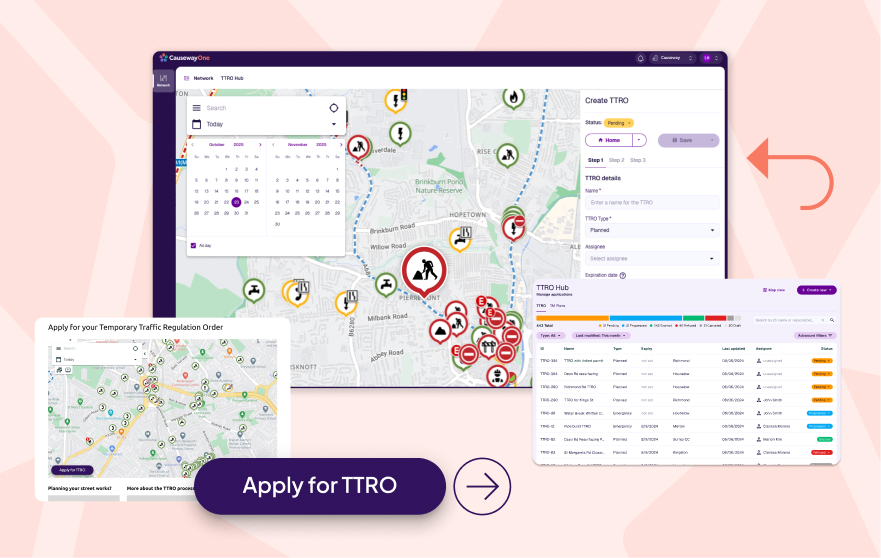It is the Government’s intention that, by 2015, a highways authority wishing to introduce a permit scheme will no longer need the Secretary of State’s approval before the scheme can be operated.
Following consultation, this and other amendments to the 2004 Traffic Management Act and 2007 Permit Scheme Regulations, allow highways authorities to approve their own schemes without reference to higher authorities although they must demonstrate compliance with existing legislation.
Jonathan Williams, Mayrise Product Consultant at Yotta looks at what this might mean for highways authorities, statutory undertakers and society as a whole.
‘Street works in the highway, whether undertaken by utility companies, highways authorities or their contractors, are a vital part of delivering essential public services.’
However, as traffic levels rise; up 2.2 per cent in Q3 2014 from the same period of 2013 and average speeds drop; falling to just 24.3 mph during the morning peak on local A roads in England – down 0.4 per cent in the year to June 2014, many road users view street works as at best an irritation and at worst a daily hell. The delay and disruption caused by street works also leads to additional costs to society. For works by utilities alone, these costs are estimated at £4 billion a year nationwide with £750 million of this staggering figure in just the London area.
Local highways authorities already have a range of tools for the management of these works including the operation of permit schemes. In simple terms Permit Schemes provide a way to manage activities on the public highway. Although varying in detail from scheme to scheme the underlying principle of permit schemes is the legal requirement of permission prior to the commencement of works. This requirement is designed to improve the co-ordination of works and minimise disruption to road users. Special conditions can also be imposed including working hours, traffic management methods and coordination with other works. Although a fee may be attracted by the permit discounts can be achieved if an applicant can demonstrate joined up working, works outside or core hours or an excellent safety record.
So what do the proposed changes mean to highways authorities? Possibly not a lot it may be argued. One of the first to introduce a permit scheme was Kent County Council; for its own works promoters in 2009 with the full scheme coming into effect in 2010. Reports demonstrate the Kent Permit Scheme achieved a number of targets in its first year of operations. These include a headline grabbing 5 years and 7 months of working days saved on full permit treatment roads. Achieved through collaborative working arrangements this equates to a saving of 4.46 per cent against total occupation. Equally impressive is a reduction of 26 per cent in the total number of congestion and coordination complaints and street works enquiries since the start of the scheme.
It is success stories like this that have prompted the proposed changes in legislation; that and perhaps an estimated cost to Government per permit scheme application of around £9,000? So in real terms are we looking at a local governance initiative or a cost saving exercise?
Local highways authorities wishing to implement a new permit scheme will still need to demonstrate compliance with relevant legislation and any amendments to existing schemes must be made with the same reference. This includes consultation with all works promoters, neighbouring authorities on whose highway network the scheme may impact, Passenger Transport Executives and emergency services. Both existing and new schemes must also be operated in an open and transparent manner with published reports.
Additional requirements include the use of electronic communication requiring specialist and proven software and, while local control is being given, it has been suggested that the use of common wording and standard conditions, developed, consulted and agreed on by the Highways and Utilities Committee (HAUC) England, be introduced to reduce complication and expense for works’ promoters.
Highways authorities and works promoters are therefore still cautious in welcoming the proposed changes in legislation. Many authorities who have either started down the permit scheme route since the changes were muted or are considering introducing a new scheme are looking for support from external organisations. Working with experienced consultants provides a confidence not only in the operation and technical compliance of the scheme but also in the outcomes for residents. Obviously this comes with a cost but, as demonstrated by Kent, the benefits of better control of street works activities can result in a range of social and economic benefits.
Jonathan Williams is an experience street works and highways professional. He has first-hand experience of the challenges faced by those at the front-line of street works and highways service delivery gained by implementing innovative schemes such as Permit and Lane Rental.



